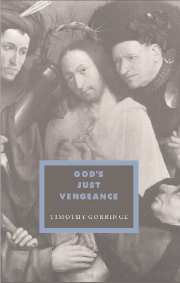Book contents
- Frontmatter
- Contents
- General editors' preface
- Acknowledgements
- List of abbreviations
- 1 Religion and retribution
- PART I THE CULTURAL FORMATION OF ATONEMENT: BIBLICAL SOURCES
- 2 Blood which makes atonement
- 3 Accounting for the cross
- PART II MAKING SATISFACTION: ATONEMENT AND PENALTY 1090–1890
- PART III CONTEMPORARY DIRECTIONS IN ATONEMENT AND PENAL THEORY
- Select bibliography
- Index
- CAMBRIDGE STUDIES IN IDEOLOGY AND RELIGION
2 - Blood which makes atonement
Published online by Cambridge University Press: 25 January 2010
- Frontmatter
- Contents
- General editors' preface
- Acknowledgements
- List of abbreviations
- 1 Religion and retribution
- PART I THE CULTURAL FORMATION OF ATONEMENT: BIBLICAL SOURCES
- 2 Blood which makes atonement
- 3 Accounting for the cross
- PART II MAKING SATISFACTION: ATONEMENT AND PENALTY 1090–1890
- PART III CONTEMPORARY DIRECTIONS IN ATONEMENT AND PENAL THEORY
- Select bibliography
- Index
- CAMBRIDGE STUDIES IN IDEOLOGY AND RELIGION
Summary
It is blood which makes atonement by reason of the life.
LeviticusThere is no forgiveness of guilt without atonement, just as there can be no reconciliation without the restoration of justice.
Jürgen MoltmannIn December 1994 Myra Hindley, imprisoned for life for her part as accomplice in a series of terrible child murders, broke the silence of thirty years to plead for release. Her press statement read, ‘I have paid my debt to society and atoned for my crime.’ This plea reaches right back, more than two thousand years, to the texts of the Old Testament. To understand it, and the theological affirmation of retributive theory in general, we need to understand and evaluate these texts. Diverse, numerous, and often heavily edited, they come to us from a period of approximately seven or eight hundred years and speak from very varying social situations. This presents a real problem of interpretation for those who take social context seriously. On the other hand, Brevard Childs’ ‘canonical criticism’ has made the important point that these texts have in fact been read as a unity over the past two thousand years and as such have made a profound contribution to the formation of Western culture. Accordingly my concern is first to understand those texts which fed in to the structure of affect which gathered around satisfaction theory, and second to argue that there are resources in the same texts in which to ground the alternative response to offenders which I shall argue for in the final chapter.
- Type
- Chapter
- Information
- God's Just VengeanceCrime, Violence and the Rhetoric of Salvation, pp. 33 - 57Publisher: Cambridge University PressPrint publication year: 1996



